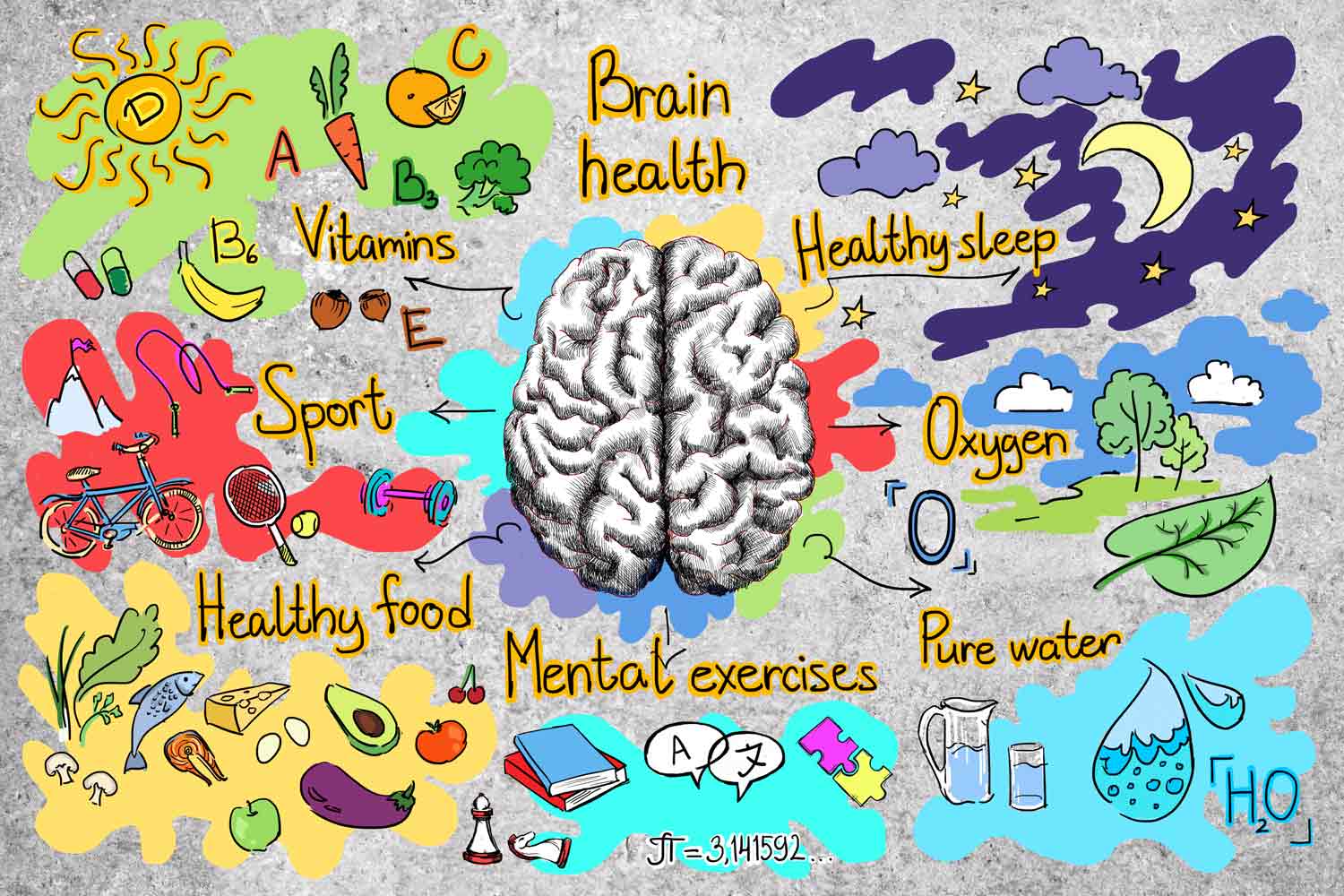Tips and Tricks to Boost Brain Function & Memory
Our brains are constantly in a state of change, and this remains true up until the day we die.
There are many factors that go into brain health such as genetics, living environment, diet, exercise, trauma etc. Because of this, we are all on different playing fields when it comes to brain health and wellness. We can’t do anything to change our genetics but there are other things we do have control over in regard to our brains.
It is also important to make the distinction between brain health and mental health. Where mental health refers to ailments such as depression, brain health is targeting ailments such as dementia.
Did you know that your brain is always changing?
That’s the one constant about the most complex organ we have that controls every part of us. “Brain plasticity” is the process of the brain to learn new information, grow new connections, and repair broken ones. Throughout life, as we age, acquire knowledge, and have more experiences, our brain continues to develop.
In an ever-changing world there is so much going on, that staying on top of our brain’s cognitive function and memory retention is one of the best things that we can do for our health and well-being.
The 9 Best Ways to Keep Your Brain Healthy!
1. Keep moving – Physical activity is good for your body and mind as it can increase oxygen flow as well as the growth of new nerve cells and connections, or synapses, between brain cells.
High-intensity and moderate-intensity aerobic exercise are not just good for your heart, they’re also good for your brain. Exercise improves your mood and cardiac function, reduces stress, and makes you more mentally alert.
You don’t need much activity to make a difference, 20 to 30 minutes of moderate-paced aerobic activity like walking, cycling, or swimming multiple times a week has been shown to have positive long-term cognitive impacts. Exercise can lower blood pressure and improve cholesterol levels, while also reducing stress. So many benefits make it a “no-brainer” for brain health.
2. Stay mentally active – Studies have shown that brain centered activities stimulate new connections between nerve cells and may even help the brain generate new cells, develop neurological plasticity, and protect against future cell loss.
Reading, playing cards, putting together a jigsaw puzzle, playing crossword puzzles or Sudoku, or completing word searches are easy ways of boosting memory and focus. Experiment with things that require manual dexterity and mental efforts, such as drawing, painting, and other crafts.
3. Eat your Omega 3’s – Oily fish are a good source of omega-3 fatty acids. Omega-3s help build membranes around each cell in the body, including the brain cells. They can, therefore, improve the structure of brain cells called neurons. It is an important fatty acid that also protects and preserves the integrity of the blood brain barrier.
A 2017 study found that people with high levels of omega-3s had increased blood flow in the brain. The researchers also identified a connection between omega-3 levels and better cognition or thinking abilities. Examples of oily fish that contain high levels of omega-3s include salmon, mackerel, tuna, herring, and sardines. People can also get omega-3s from soybeans, nuts, flaxseed, and other seeds.
4. Value your sleep – Sleep plays an important role in your brain health. There are some theories that sleep helps clear abnormal proteins in your brain and consolidates memories, which boosts your overall memory and brain health.
Adults need between seven and nine hours of sleep nightly to benefit and perform at their cognitive peak each day. It is important that you try to get more hours of consecutive sleep per night, not fragmented sleep of two- or three-hour increments.
Consecutive sleep gives your brain the time to consolidate and store your memories effectively. Poor sleep is one of the biggest causes of reduced concentration and memory functioning.
5. Embrace your social life – Creating and nurturing connections with others keeps life fun and interesting and has been linked to lower blood pressure, lower risk of dementia, and longer life expectancy. Positive relationships can be just as meaningful as nutrition and physical activity to our health and well-being. Maintaining a strong social network can contribute to a longer, healthier life.
Look for opportunities to connect with loved ones, friends, and others in your community especially if you live alone. Consider joining a church, participating in community events, volunteering, or becoming active in a club or cause that you’re interested in.
Research links solitary confinement to brain atrophy, so remaining socially active may have the opposite effect and strengthen the health of your brain.
6. Manage your stress – Excessive worry and stress has been shown to lower performance on cognitive tests. Stress can affect mood, memory, and promote anxiety.
Engaging in weekly stress reduction exercises will improve your overall sense of calm. Intermittent and long-term stress impacts the brain negatively and has even been linked to inflammation and chronic illness. Learn how to stress less.
Consider an appointment with a mental health provider if you need more support. Try yoga, meditation, taking a walk, or listening to music to help you relax and clear your head. It is also important to pay attention to the root cause of your stress and make a plan to address it.
7. Maintain blood sugar levels – Diabetes is a significant risk factor for dementia. Like lowering your blood pressure or controlling cholesterol, you can help prevent diabetes by eating right, exercising regularly, and staying lean. Maintaining your blood sugar levels will also help with sugar crashes, which can cause brain fogginess.
8. Don’t be afraid to dance! – The Centers for Disease Prevention and Control notes that learning new dance moves can increase your brain’s processing speed and memory.
In other words, bust a move on the dance floor and your brain will thank you.
* Take a salsa, tap, hip-hop, or contemporary dance class.
* Try a Zumba or jazz exercise class.
* Watch an online video with fun dance moves you’ve always wanted to learn.
* Grab a partner and learn to ballroom dance or gather your friends and go line dancing.
9. Try the Mediterranean diet – This diet emphasizes plant-based foods, whole grains, fish, and healthy fats, such as olive oil. It incorporates much less red meat and salt than a typical American diet.
Studies show people who closely follow a Mediterranean diet are less likely to have Alzheimer’s disease than people who don’t follow the diet. Further research is needed to determine which parts of the diet have the biggest impact on your brain function.
However, we do know that omega fatty acids found in extra-virgin olive oil and other healthy fats are vital for your cells to function correctly, appear to decrease your risk of coronary artery disease, and might increase mental focus and slow cognitive decline in older adults.
What do you do to keep your brain sharp and active?

p.s. Just in case you are looking for the perfect skincare product, or any other wellness need, reach out to us here at 916-253-9276 and we would be happy to help you find exactly what you are looking for.
We are deeply committed to sharing our knowledge of health and therefore have carefully chosen the products we offer in our store. You’ll find only the highest quality brands and a large selection to choose from so you’re sure to find exactly what you need.
If you can’t make it into the store, we’re always happy to deliver it to you because your health and happiness are our #1 priority!
We would love to get to know you better!
Drop a comment below and let us know more about you!


